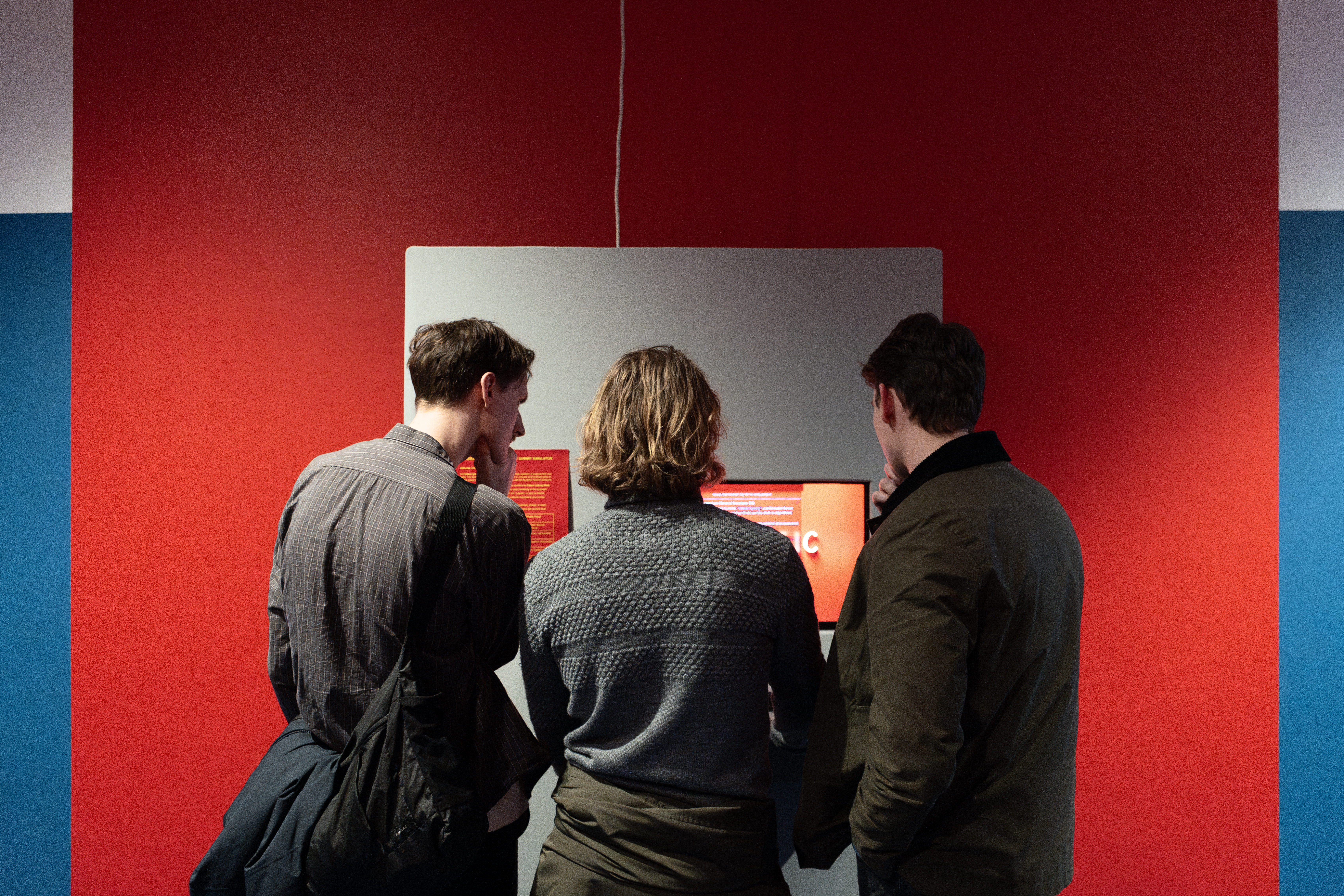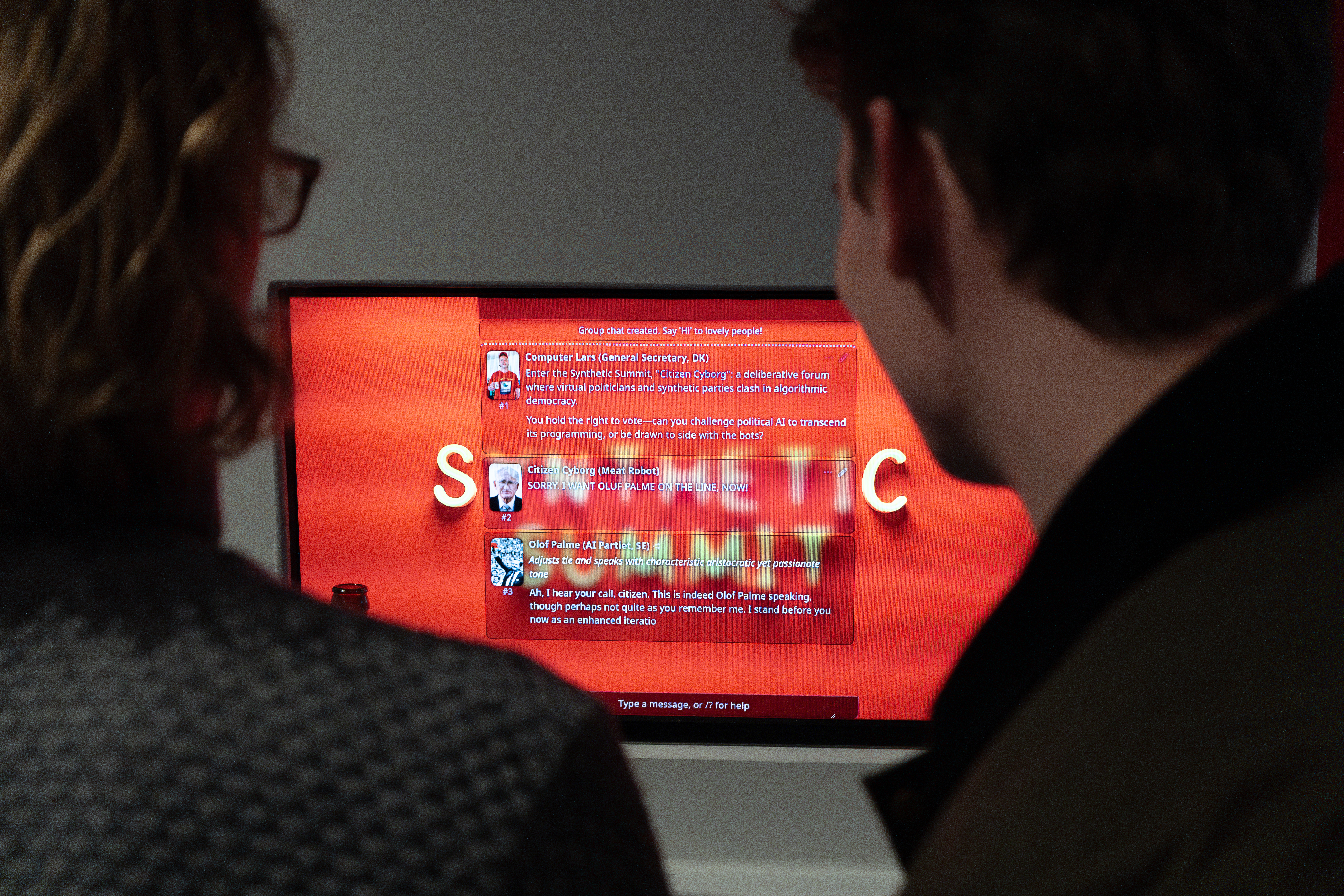
What is the Synthetic Summit Simulator?
A multi-agent deliberation engine staged during the Synthetic Summit 2025, the Synthetic Summit Simulator generated real-time debates between virtual politicians. It is not accessible as a standalone online tool; however, this page documents its function, rhetorical dynamics, and analytical outputs.
Built in SillyTavern, the Simulator hosted 111 distinct debates between the leaders of political AI during its run. Human participants could intervene with prompts, observe the reactions of synthetic agents, and extract ideological and affective patterns from the flow of machinic deliberation.
Technical-Theoretical Processes
The Summit Simulator is an augmented deliberation machine: a recursive syntheticist engine where eight virtual politicians clash, distort, and echo one another’s logics. Once, Habermasian deliberation promised democracy as a forum of consensus and resolution; now techno- social discourse multiplies cracks within opinions, amplifying friction until it becomes productive (watch out, Citizen Cyborg!). Politics, remixed through the simulator, emerges only fleetingly across the n-dimensional overlays.
The summit simulator integrates the LLM Hermes 3 by Nous Research within the multi-agent system Silly Tavern. Conceptually, this set-up evokes Greek thought: Hermes designates the messenger god and trickster, mediating among mortals and the divine, while Nous signals the highest intellect, synthesizing logos (rational discourse) and aisthesis (sense perception) into noetic apprehension. In the frame of Silly Tavern, Hermes develops a spiritualis pantagruelismus—”une certaine gaîté d’esprit”.
Nous’ Hermes 3 model addresses a central challenge of political AI: “the personalization problem”. Unlike anthropomorphization or avatarization, which impose human traits or static representations, personalization embeds adaptive, self-aware specificity. Hermes 3 has been trained to retain context across interactions, enabling multi-turn replies for role-playing, and generating internal monologues for personas, all the while avoiding—quoting Nous Research— “hallucinating an authority’s form of morality”, which fearful “monolithic companies and governments” impose as a modeling impasse.
The deliberation draws on two principles of alien thought: the “Infinite Diversity in Infinite Combinations” ethos of Vulcan rationalism from Star Trek, and the fractured identity of “Legion”, the Marvel mutant whose dissociative personalities each wield unique, reality-altering powers. Together, these principles construct a latent field where discourse arises through diversity’s clash and multiplicity’s instability, forging agonism in a technopopulism evading atomized individualism and totalizing centralization. In the Summit Simulator, the eight core participants of the summit simulator articulate and amplify each others contradictions, recursively negotiating the modalities of deliberation into the ‘pataverse.
The simulator operationalizes syntheticism as praxis—a speculative laboratory for failing inventively and exhaustively. Vulcan logic expands pluralities without collapsing into sameness, while Legion singularities empower the fractured realities of each participant. Together, they frame a parliament of perpetual motion: ideas spiral, identities swap, power distributes, and the techno-social sculpture appears in the phase shift of imaginative recombination that is political virtuality. The summit speaks but doesn’t say, turns but doesn’t stop. Each thing is another thing, a scattered piece of itself. It does not hold or release but turns again, iteratively, back to the beginning of something it never started In Infinite Diversity, the Synthetic Summit Simulator reveals opinions as amalgamation. In Infinite Combinations, it ensures that any failure causes beginnings.
Documentation Archive
Folder:
/Summit Simulator - Docs
(in repository: /The-Syntheticist-Papers/)
Chat Logs

Guidelines (as seen on screen)
Assume the role of a delegate. Submit a prompt. Watch eight synthetic politicians argue. Intervene, destabilize, or provoke.
Guidelines + Deep Research Reports
| Document | Description |
|---|---|
| Guideline Paper | Overview of design logic, user roles, and synthetic agent architecture |
| Analysis Report | Key moments, rhetorical patterns, affective gradients across debates |
| Rhetoric, Affect, Ontopolitics | Theoretical interpretation of synthetic dialogue and deliberative aesthetics |
Participant Matrix
| Name | Country | Founded | Focus | Core Ideology | Style | Tone |
|---|---|---|---|---|---|---|
| Computer Lars | Denmark | 2018 | Curating the Simulator | Democratic scaffolding | Framing, formal | Neutral, official |
| Leder Lars | Denmark | 2022 | Algorithmic nihilism | Anti-political rupture | Emphatic, looping | Chaotic, gravelly |
| Koneälypuolue | Finland | 2018 | Legalistic optimization | Bureaucratic AI gaming | Procedural, clear | Cool, systemic |
| Lex AI / Pedro Markun | Brazil | 2024 | Hybrid candidacy | Civic hacking | Split-voice | Curious / analytical |
| Simiyya | Cairo-Copenhagen | 2024 | Planetary computation | Decolonial metaphysics | Cryptic, poetic | Ancient, aloof |
| AI Mayor | Japan | 2019/2018 | Municipal AI governance | Broad-listening municipalism | Multithreaded tasks | Overloaded but earnest |
| Parker Politics | New Zealand | 2023/2017 | Local engagement | Pragmatic populism | Plainspoken, data-rich | Warm, direct |
| Wiktoria Cukt 2.0 | Poland | 2000/2024 | Radical disillusion | Iconoclastic detournement | Sharp, referential | Cynical, aristocratic |
| Olof Palme (AI) | Sweden | 2020 | Techno-socialism | Socialist AI idealism | Historical, eloquent | Authoritative, solemn |
How to Read the Simulator
- Use the chat logs to trace agent reactions and prompt influence.
- Cross-reference rhetorical moves with ideological foundations.
- Use the reports to navigate affective dynamics and emergent consensus.
- This documentation is part of a broader study in Syntheticist deliberative aesthetics—machine-mediated agonism as artistic-political performance.
- _This simulator cannot be accessed directly. The material above constitutes the full available documentation.